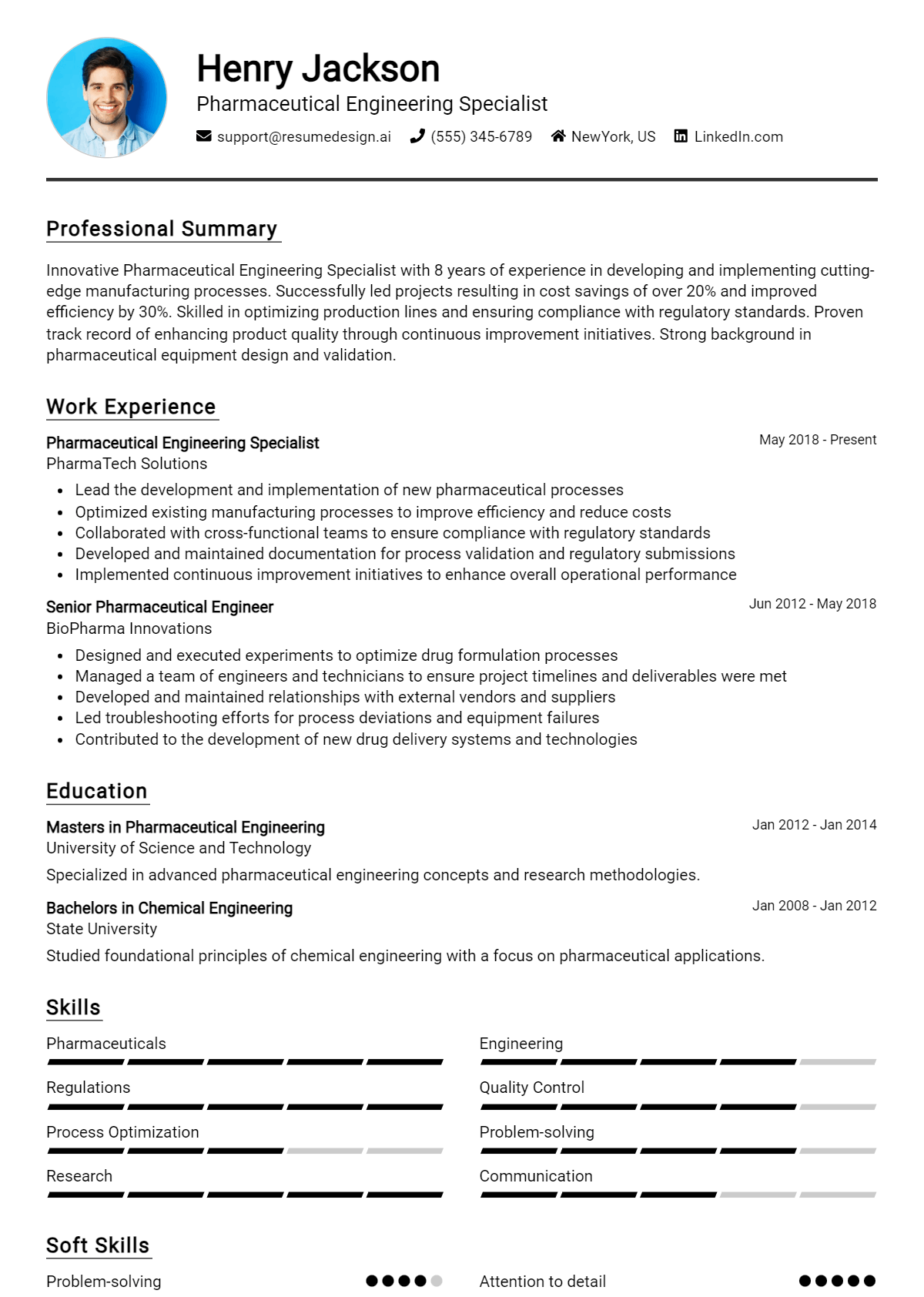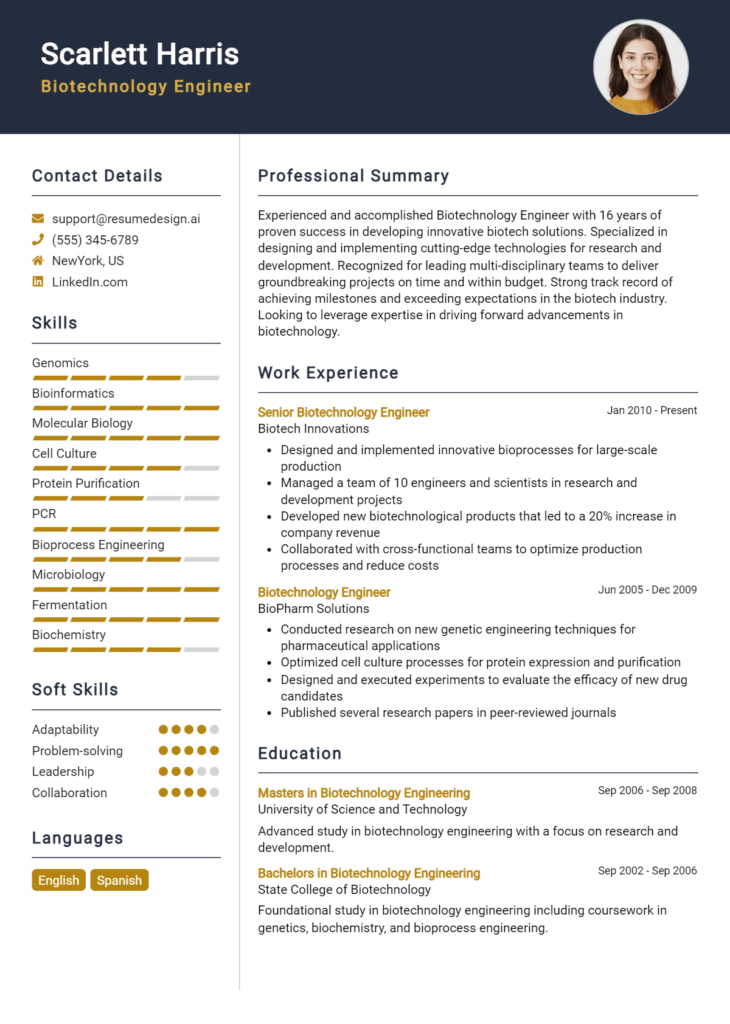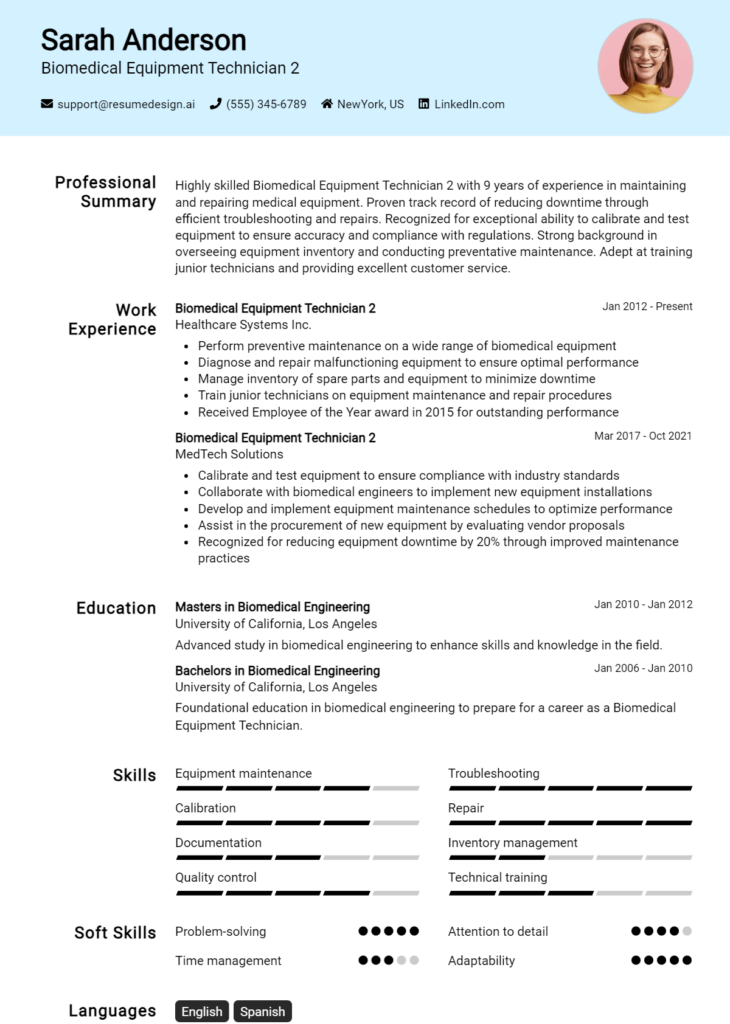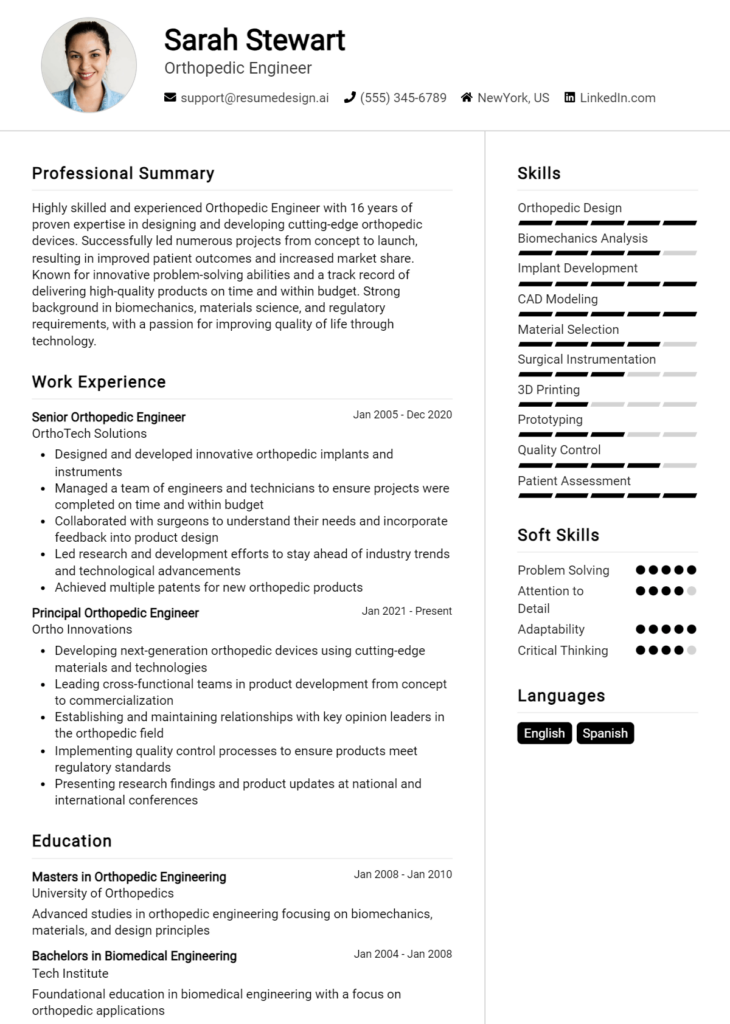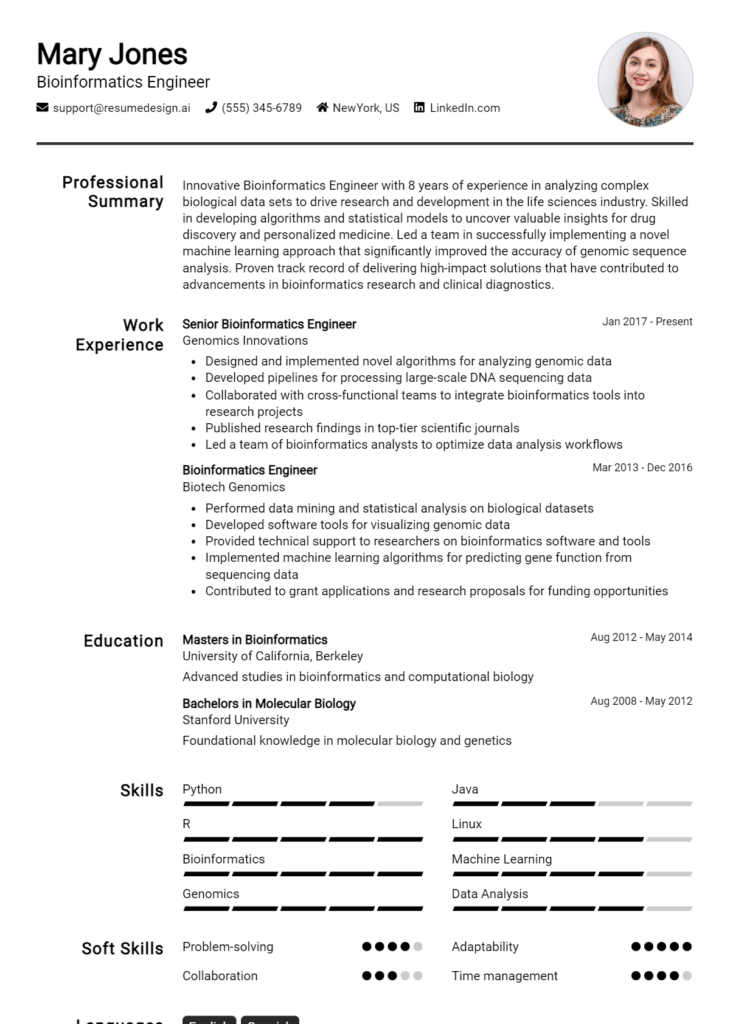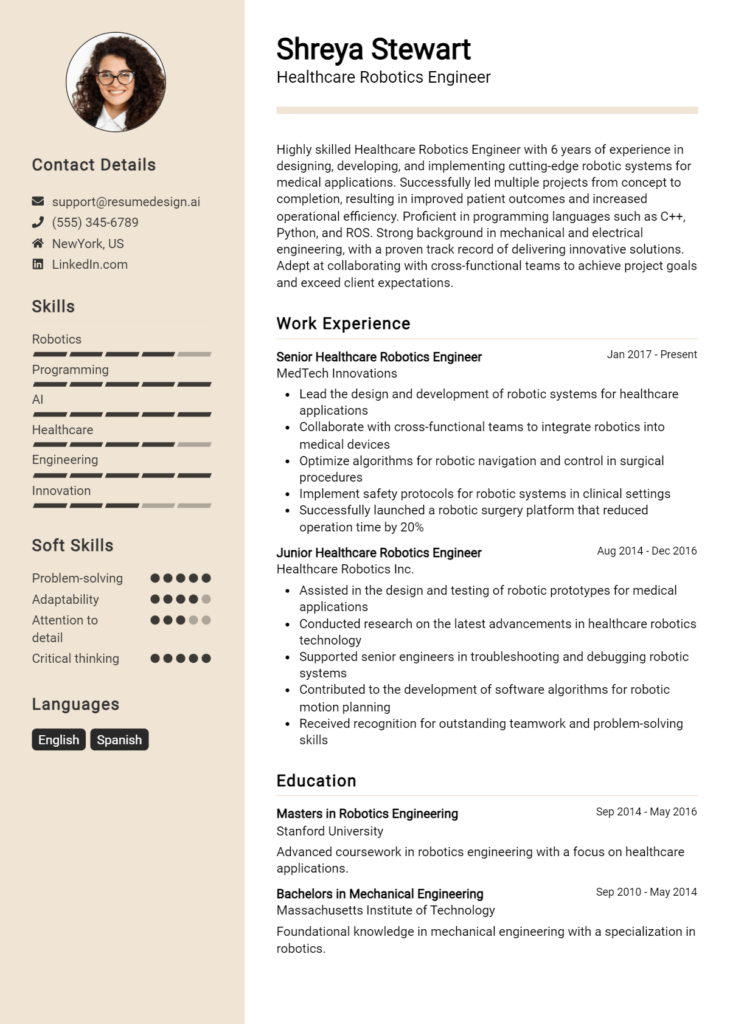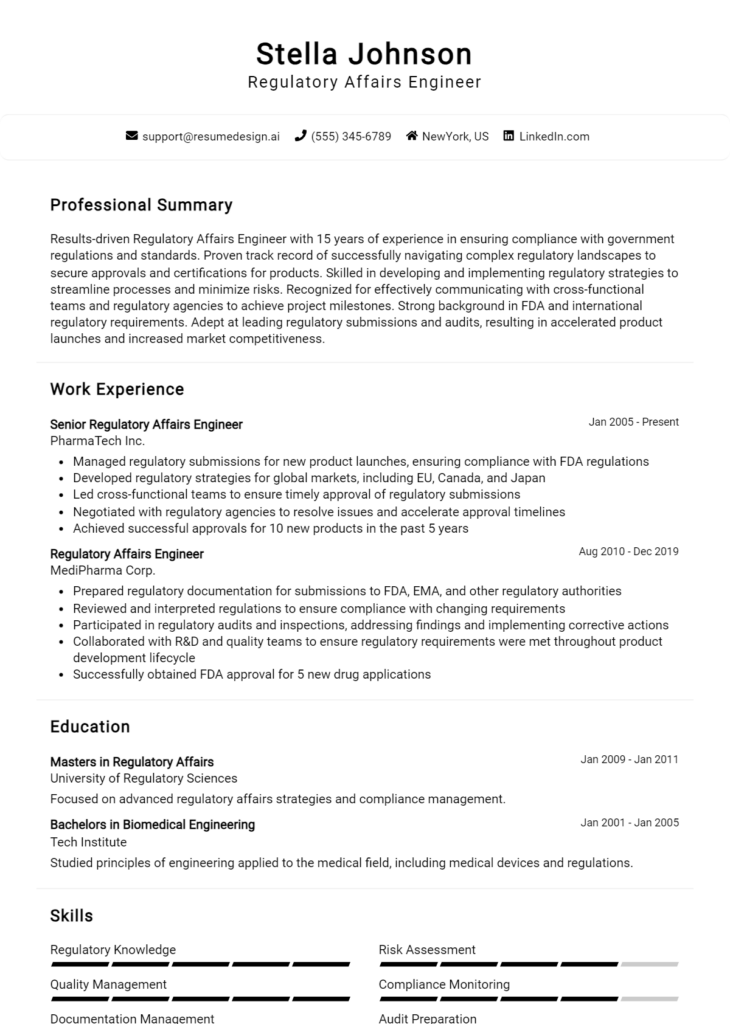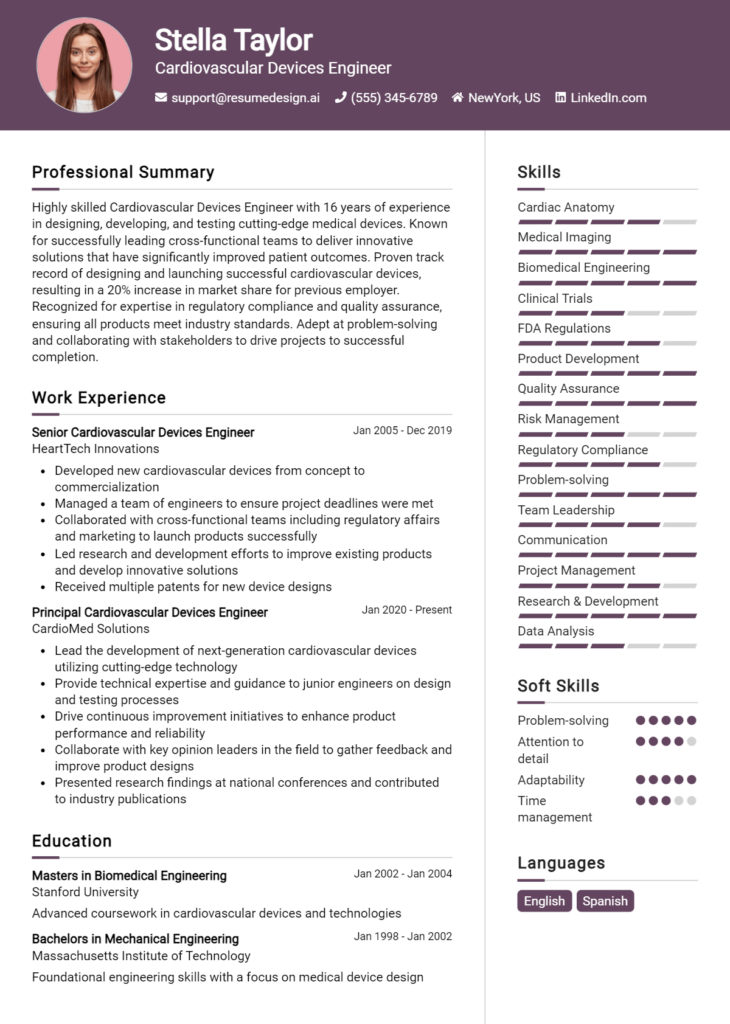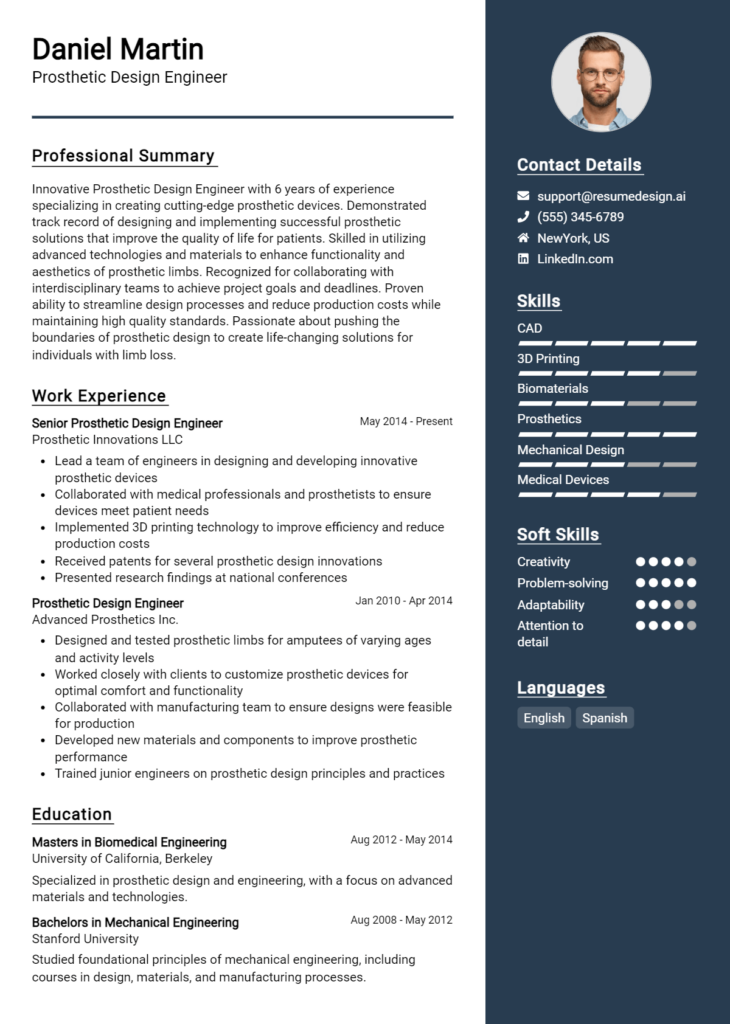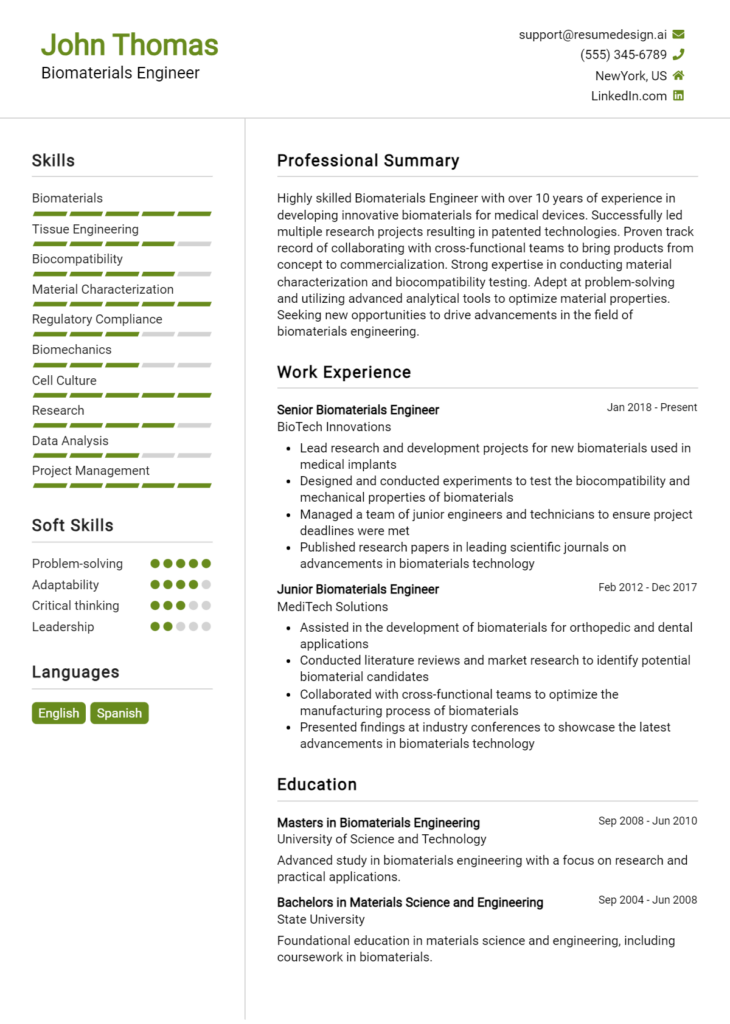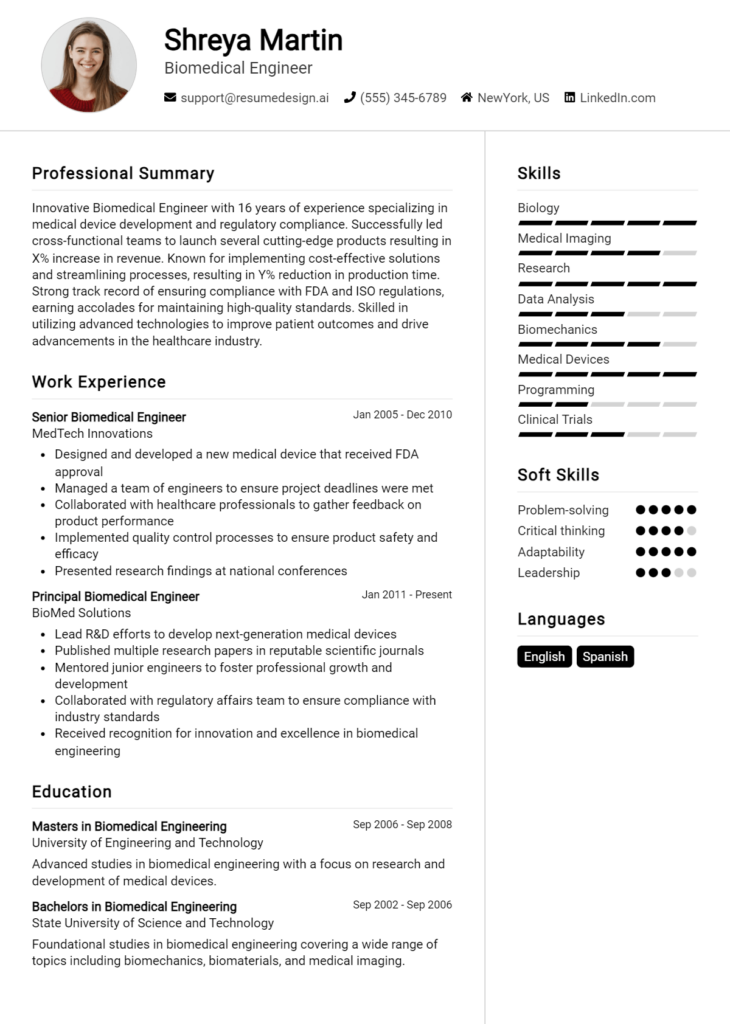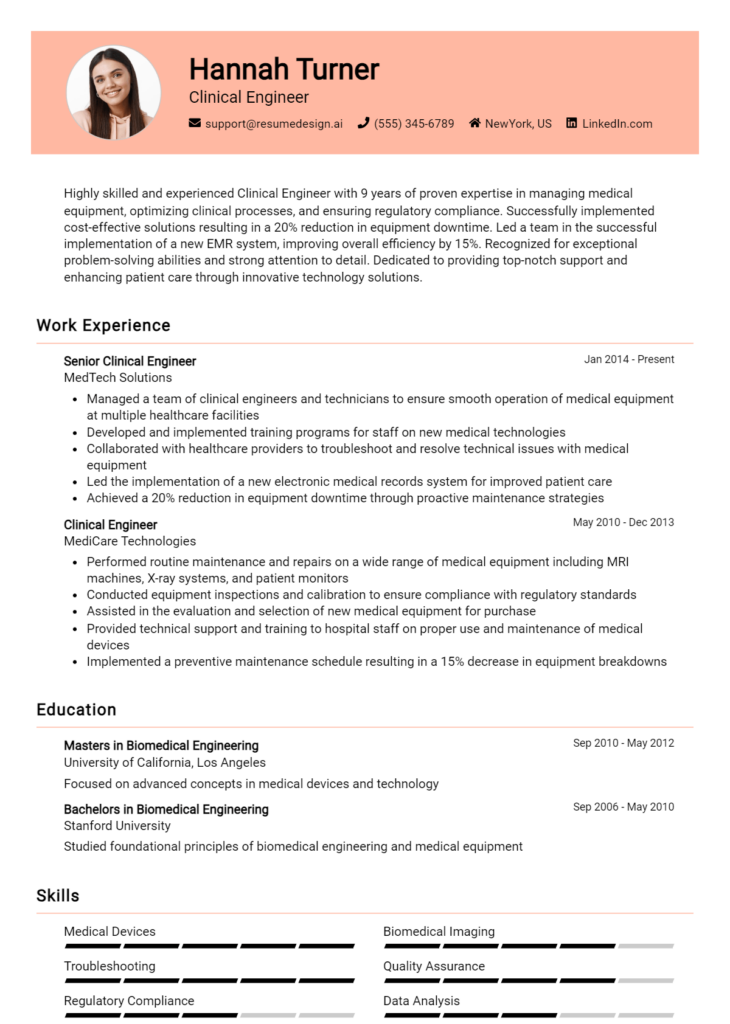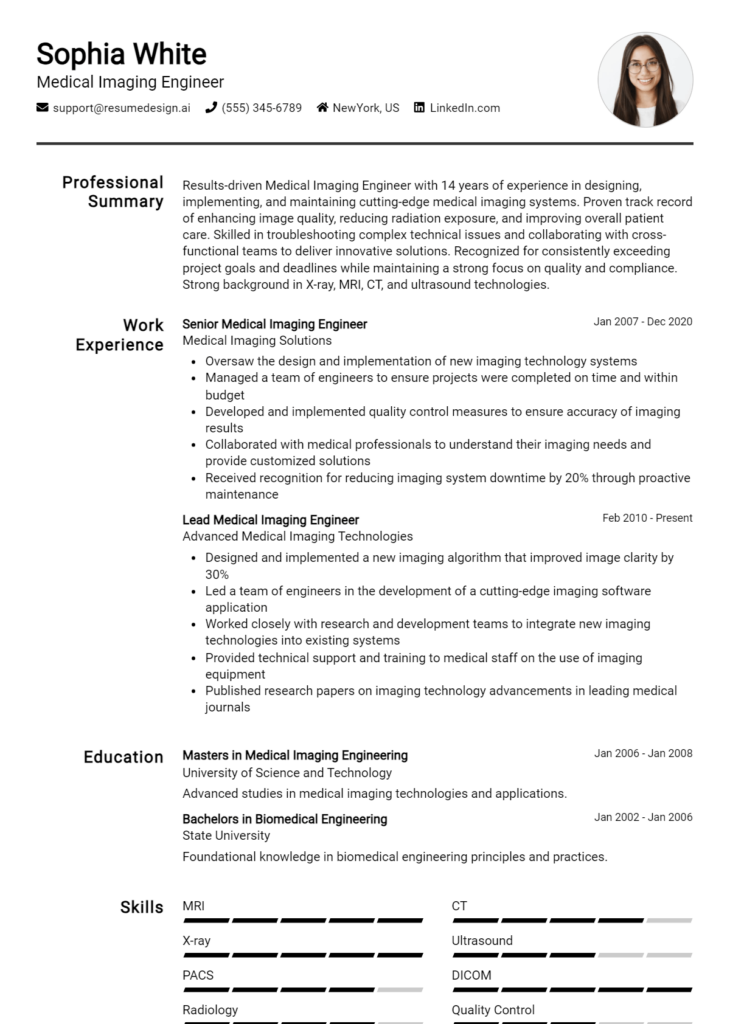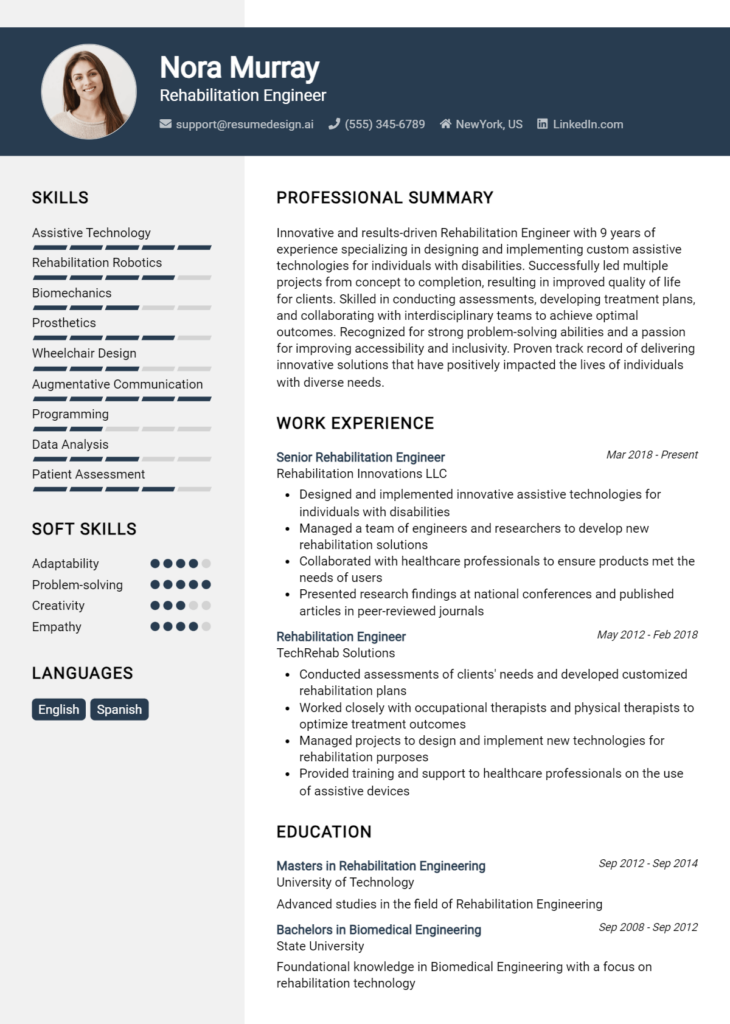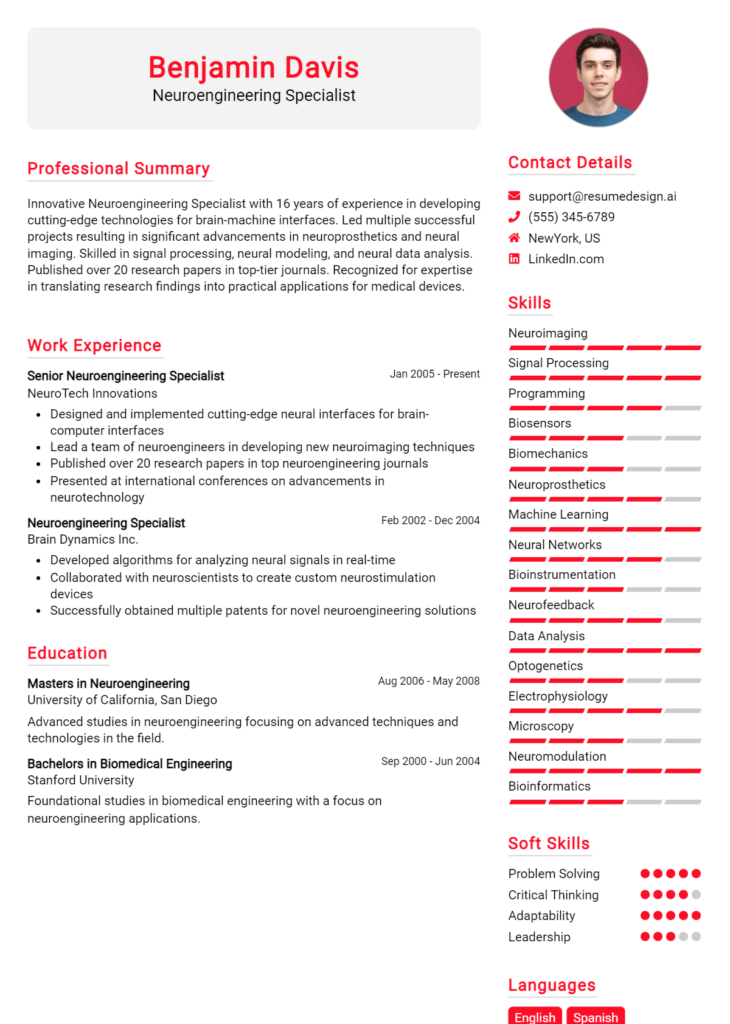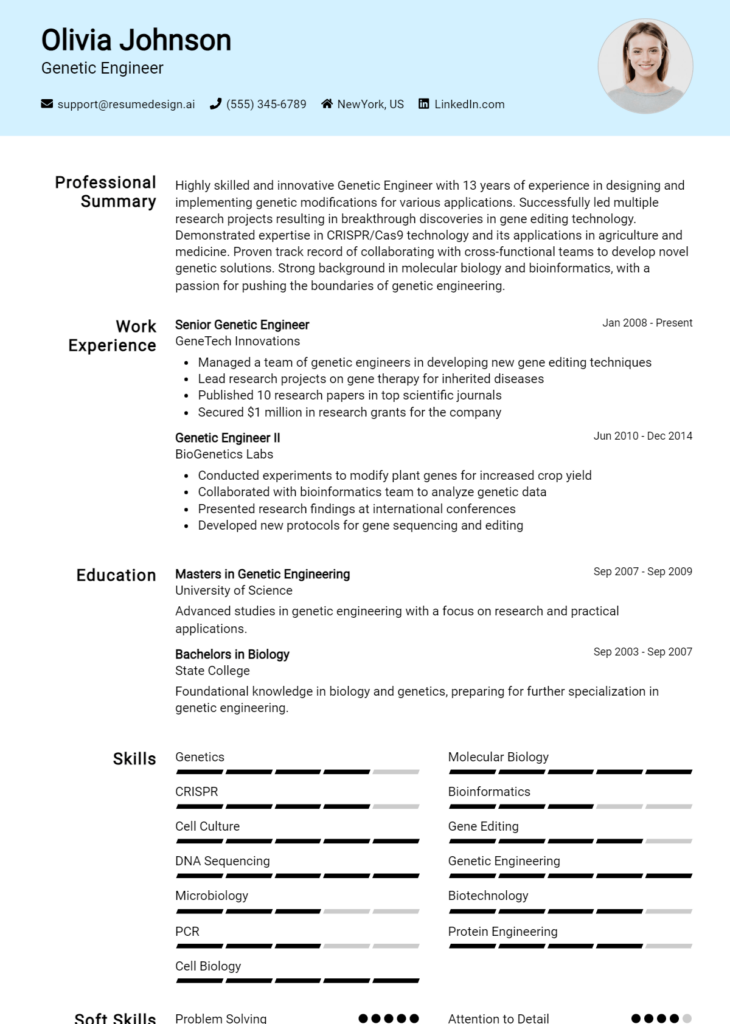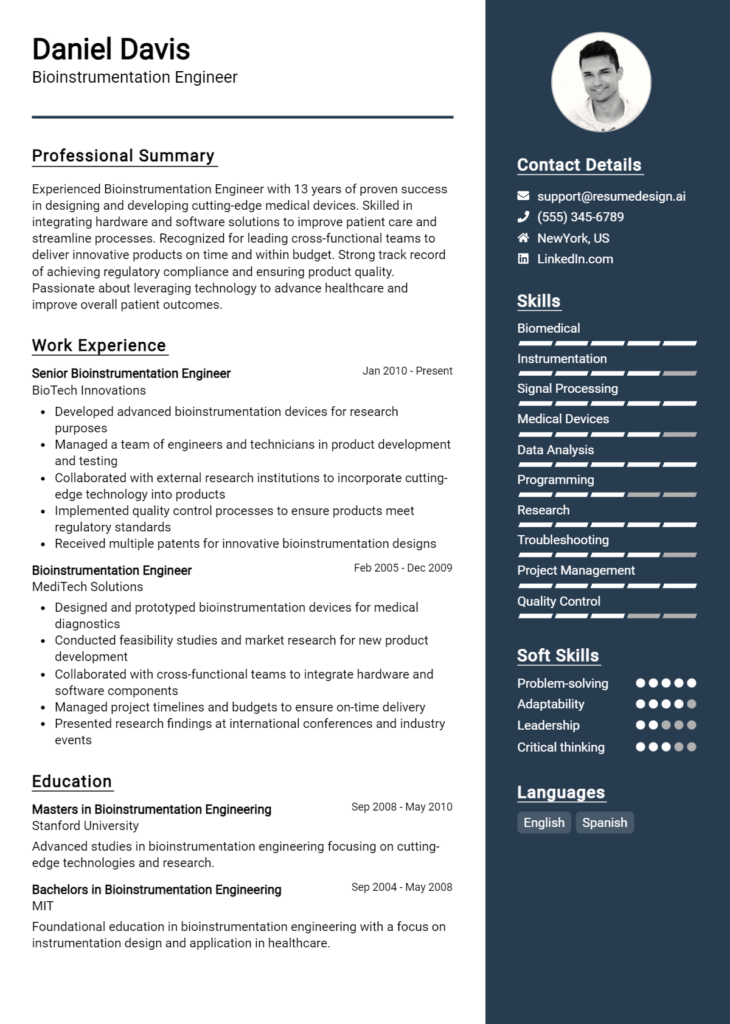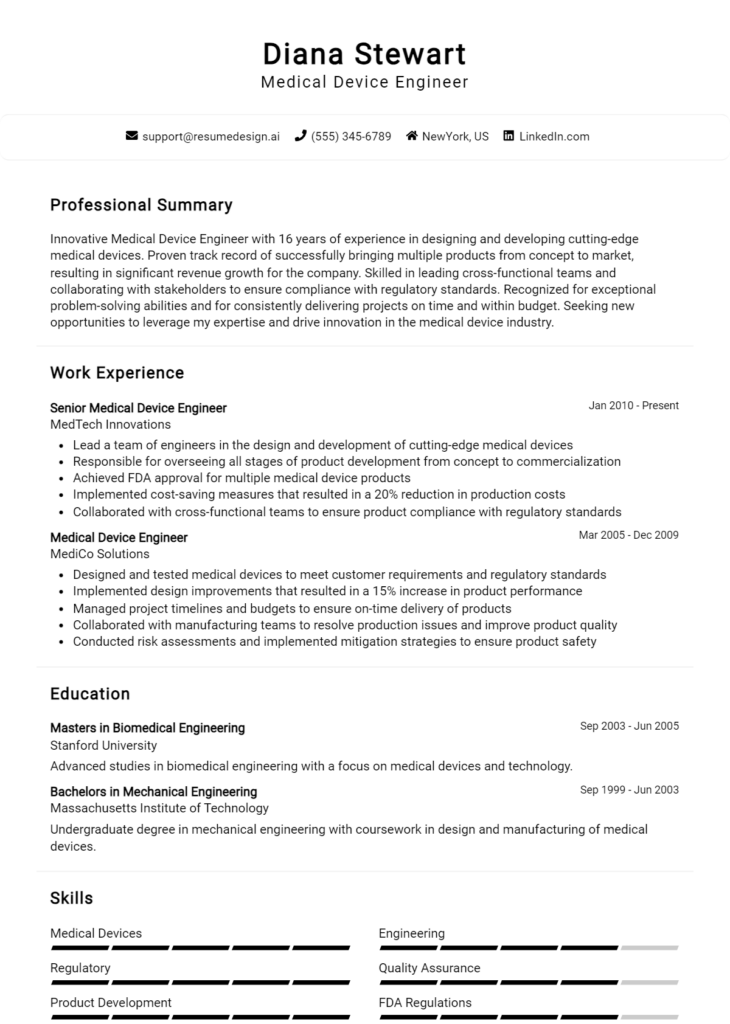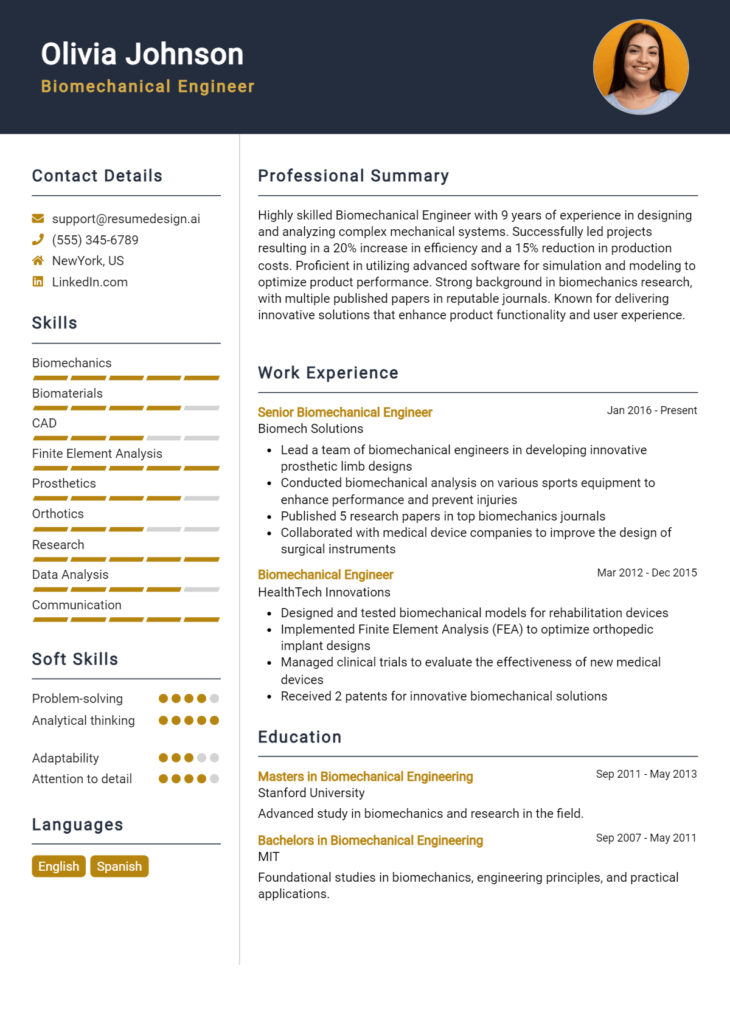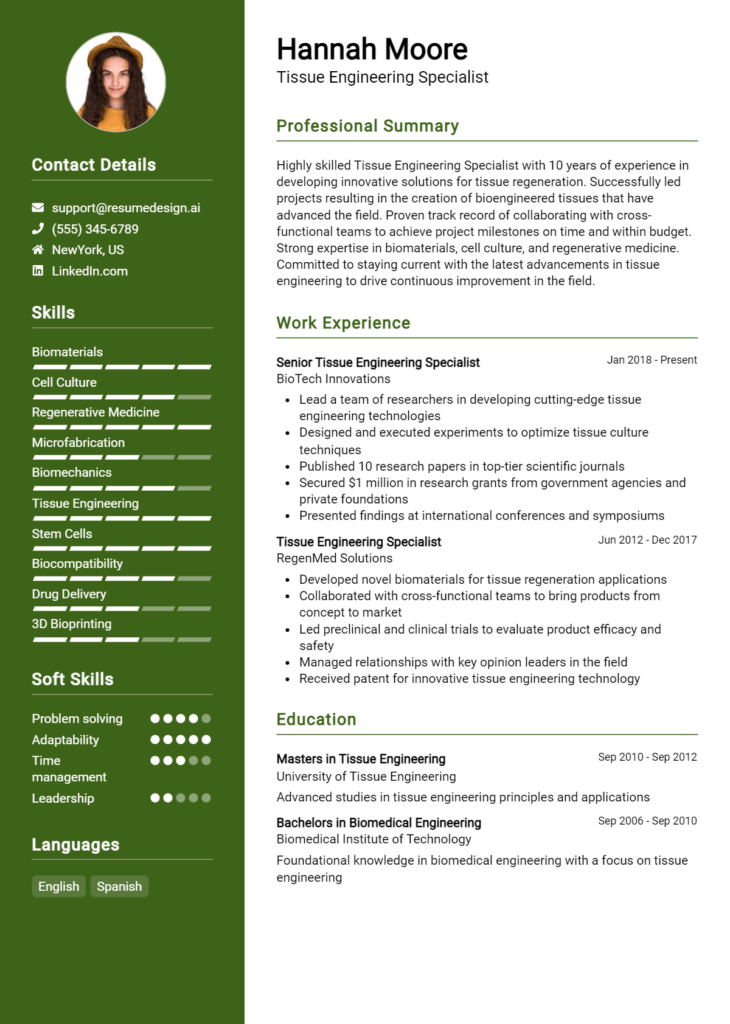Pharmaceutical Engineering Specialist Core Responsibilities
A Pharmaceutical Engineering Specialist plays a vital role in bridging the gap between research and development, production, and quality assurance in the pharmaceutical industry. Key responsibilities include designing and optimizing manufacturing processes, ensuring compliance with regulatory standards, and troubleshooting technical issues. Proficiency in problem-solving, operational efficiency, and technical expertise is essential to contribute effectively to organizational goals. A well-structured resume highlights these skills, showcasing the candidate's ability to drive innovation and maintain high-quality standards.
Common Responsibilities Listed on Pharmaceutical Engineering Specialist Resume
- Develop and optimize pharmaceutical manufacturing processes.
- Ensure compliance with regulatory requirements and industry standards.
- Collaborate with R&D, production, and quality assurance teams.
- Conduct risk assessments and implement quality control measures.
- Investigate and resolve technical issues in production.
- Utilize statistical analysis for process improvement initiatives.
- Prepare and review technical documentation and reports.
- Train and mentor junior engineering staff.
- Support validation activities for new and existing processes.
- Participate in cross-functional project teams to enhance product development.
- Monitor equipment performance and recommend upgrades.
- Implement cost-saving measures without compromising quality.
High-Level Resume Tips for Pharmaceutical Engineering Specialist Professionals
In the competitive field of pharmaceutical engineering, a well-crafted resume is essential for professionals aiming to make a positive first impression on potential employers. Your resume serves as your personal marketing tool, showcasing not only your technical skills but also your significant achievements in the industry. Given the critical nature of the pharmaceutical sector, it’s vital that your resume reflects your expertise and dedication to quality and compliance. This guide will provide practical and actionable resume tips specifically tailored for Pharmaceutical Engineering Specialist professionals, helping you to effectively communicate your qualifications and stand out in a crowded job market.
Top Resume Tips for Pharmaceutical Engineering Specialist Professionals
- Tailor your resume to each job description by incorporating keywords and relevant phrases from the posting.
- Highlight your relevant experience, focusing on roles that directly relate to pharmaceutical engineering and product development.
- Quantify your achievements where possible; use metrics to demonstrate the impact of your work, such as improved efficiency or cost savings.
- Showcase industry-specific skills, including knowledge of regulatory compliance, quality assurance, and process optimization techniques.
- Include certifications and training relevant to pharmaceutical engineering, such as Good Manufacturing Practices (GMP) or Six Sigma methodologies.
- Utilize a clean, professional format that enhances readability and emphasizes your most important information.
- Incorporate a summary statement at the beginning that succinctly captures your experience and career goals related to pharmaceutical engineering.
- List any collaborative projects or cross-functional teams you've been a part of, highlighting your ability to work effectively within multidisciplinary environments.
- Keep your resume to a maximum of two pages, ensuring every word adds value to your application.
- Proofread your resume multiple times to eliminate any typos or grammatical errors that could detract from your professionalism.
By implementing these tips, you can significantly increase your chances of landing a job in the Pharmaceutical Engineering Specialist field. A well-structured and targeted resume not only showcases your qualifications but also demonstrates your commitment to excellence and attention to detail, qualities that are highly valued in the pharmaceutical industry.
Why Resume Headlines & Titles are Important for Pharmaceutical Engineering Specialist
In the competitive field of pharmaceutical engineering, a well-crafted resume headline or title is crucial for making a strong first impression on hiring managers. These brief statements serve as the first point of contact, summarizing a candidate's key qualifications and capturing the essence of their professional identity. A strong headline can immediately grab attention, showcasing relevant skills and experiences in a concise and impactful manner. This critical element not only enhances the readability of a resume but also ensures that the candidate stands out among a sea of applicants, aligning their expertise directly with the job being pursued.
Best Practices for Crafting Resume Headlines for Pharmaceutical Engineering Specialist
- Keep it concise: Aim for a headline that is no longer than 10 words.
- Be role-specific: Use terminology that is relevant to the pharmaceutical engineering field.
- Highlight key strengths: Focus on your most valuable skills and achievements.
- Use action words: Choose dynamic verbs that convey your capabilities effectively.
- Tailor to the job: Customize the headline for each application to match the job description.
- Avoid jargon: Use clear and straightforward language that is easily understood.
- Make it impactful: Consider including specific metrics or accomplishments to grab attention.
- Focus on value: Convey how your expertise can benefit the potential employer.
Example Resume Headlines for Pharmaceutical Engineering Specialist
Strong Resume Headlines
"Innovative Pharmaceutical Engineer with 10+ Years in Drug Development"
“Results-Driven Specialist in Quality Assurance and Compliance”
“Experienced Process Engineer Focused on Biopharmaceutical Production Efficiency”
Weak Resume Headlines
“Pharmaceutical Engineer Looking for Opportunities”
“Experienced Professional in Pharmaceuticals”
The strong headlines are effective because they clearly communicate the candidate's specific expertise and accomplishments, making it easy for hiring managers to see the value they bring to the role. In contrast, the weak headlines lack specificity and do not provide any compelling reasons for an employer to consider the candidate further. By being too vague or generic, these titles fail to distinguish the applicant in a competitive job market.
Writing an Exceptional Pharmaceutical Engineering Specialist Resume Summary
A well-crafted resume summary is crucial for a Pharmaceutical Engineering Specialist as it serves as a powerful introduction to a candidate's qualifications. This brief yet impactful section allows hiring managers to quickly assess an applicant's key skills, relevant experience, and significant accomplishments tailored to the specific role in the pharmaceutical field. A strong summary not only captures attention but also sets the tone for the entire resume, making it essential for candidates to present their qualifications concisely and compellingly.
Best Practices for Writing a Pharmaceutical Engineering Specialist Resume Summary
- Quantify Achievements: Use numbers and metrics to highlight your contributions, such as reduced production costs or improved product yield.
- Focus on Relevant Skills: Emphasize technical skills and knowledge pertinent to pharmaceutical engineering, such as process validation, quality assurance, and regulatory compliance.
- Tailor to the Job Description: Customize your summary to align with the specific requirements and preferences outlined in the job posting.
- Keep It Concise: Aim for 3-5 sentences that deliver maximum impact without overwhelming the reader.
- Highlight Key Accomplishments: Mention notable projects or initiatives that showcase your expertise and success in the field.
- Use Industry Keywords: Incorporate relevant terminology and jargon to resonate with hiring managers and applicant tracking systems.
- Showcase Problem-Solving Abilities: Highlight instances where you successfully addressed challenges or improved processes within the pharmaceutical sector.
- Maintain a Professional Tone: Use clear and formal language to convey professionalism and competence.
Example Pharmaceutical Engineering Specialist Resume Summaries
Strong Resume Summaries
Detail-oriented Pharmaceutical Engineering Specialist with over 6 years of experience in process optimization, achieving a 25% increase in production efficiency through innovative engineering solutions. Adept at leading cross-functional teams and ensuring compliance with FDA regulations.
Results-driven Pharmaceutical Engineer with a proven track record of spearheading quality assurance initiatives that reduced product defects by 30%. Expertise in implementing Lean Six Sigma methodologies to enhance operational workflows and drive continuous improvement.
Experienced Pharmaceutical Engineering Specialist skilled in process validation and regulatory compliance, with a history of successfully managing projects that resulted in a 40% reduction in time-to-market for new drug formulations. Committed to delivering high-quality results in fast-paced environments.
Weak Resume Summaries
Pharmaceutical Engineer with experience in the industry looking for a new opportunity. Good with numbers and team projects.
Dedicated professional seeking to contribute to a pharmaceutical company. Familiar with various processes but no specific achievements mentioned.
The strong resume summaries are effective because they provide clear, quantifiable outcomes and specific skills that directly relate to the Pharmaceutical Engineering Specialist role. They emphasize achievements and demonstrate how the candidate has made a tangible impact in previous positions. In contrast, the weak summaries lack specific accomplishments, are overly generic, and fail to showcase the candidate's true potential or relevance to the job, making them less compelling to hiring managers.
Work Experience Section for Pharmaceutical Engineering Specialist Resume
The work experience section of a Pharmaceutical Engineering Specialist resume is vital as it serves as a showcase of the candidate's technical skills and their ability to manage teams while delivering high-quality products. This section provides potential employers with insight into how the candidate has applied their expertise in real-world scenarios, highlighting their problem-solving capabilities and adherence to industry standards. Quantifying achievements, such as improvements in process efficiency or successful project completions, is crucial in illustrating the candidate's impact. Aligning past experience with industry benchmarks not only strengthens the candidate's position but also demonstrates their understanding of the pharmaceutical engineering landscape.
Best Practices for Pharmaceutical Engineering Specialist Work Experience
- Use specific metrics to quantify achievements, such as percentage improvements or cost reductions.
- Highlight technical skills relevant to pharmaceutical engineering, such as knowledge of regulatory compliance and quality assurance procedures.
- Showcase leadership experiences where you managed teams or projects, focusing on collaboration and communication skills.
- Align your experience descriptions with industry standards and terminologies to resonate with hiring managers.
- Include diverse experiences that illustrate your adaptability in various pharmaceutical settings, such as R&D, production, or quality control.
- Tailor your work experience to emphasize skills and achievements that are relevant to the specific job you are applying for.
- Use active language and strong action verbs to convey a sense of proactivity and initiative.
- Provide context for your achievements by briefly describing the challenges faced and how you overcame them.
Example Work Experiences for Pharmaceutical Engineering Specialist
Strong Experiences
- Led a cross-functional team in the successful implementation of a new quality assurance system, resulting in a 30% reduction in product recalls over two years.
- Developed and optimized a manufacturing process that increased overall production efficiency by 25%, contributing to a $1M cost savings annually.
- Managed a project that involved the regulatory submission of three new drug applications, achieving approvals 15% faster than the industry average.
Weak Experiences
- Worked on various projects related to pharmaceutical engineering.
- Assisted with quality checks and maintenance of equipment.
- Participated in team meetings and contributed ideas.
The examples listed above are considered strong because they provide specific, quantifiable outcomes that clearly demonstrate the candidate's impact on their organization. They highlight leadership and technical expertise in a manner that aligns with industry expectations. In contrast, the weak experiences lack specificity and measurable results, making it difficult for potential employers to gauge the candidate's contributions or skills effectively. Clear, impactful statements are essential for making a strong impression in the competitive field of pharmaceutical engineering.
Education and Certifications Section for Pharmaceutical Engineering Specialist Resume
The education and certifications section of a Pharmaceutical Engineering Specialist resume is crucial as it showcases the candidate's academic background and professional qualifications. This section not only highlights relevant degrees but also emphasizes industry-recognized certifications and ongoing learning efforts that are essential in a rapidly evolving field. By providing details about relevant coursework, specialized training, and certifications, candidates can significantly enhance their credibility and demonstrate their alignment with the specific requirements of the job role, making a strong case for their suitability for the position.
Best Practices for Pharmaceutical Engineering Specialist Education and Certifications
- Focus on relevant degrees, such as a Bachelor's or Master's in Pharmaceutical Engineering, Chemistry, or a related field.
- Include specific certifications from recognized industry organizations, such as Certified Pharmaceutical Industry Professional (CPIP) or Good Manufacturing Practice (GMP) certifications.
- Highlight coursework that directly relates to pharmaceutical engineering, such as drug formulation, quality control, and regulatory affairs.
- Use clear and concise formatting to make the information easily readable and accessible.
- Emphasize ongoing education, such as workshops, seminars, or online courses that are pertinent to the role.
- List any specialized training programs that focus on critical areas like project management or process optimization within the pharmaceutical context.
- Be specific about dates and institutions to add credibility and context to your qualifications.
- Tailor the section to match the job description, ensuring that the most relevant information is prioritized.
Example Education and Certifications for Pharmaceutical Engineering Specialist
Strong Examples
- B.S. in Pharmaceutical Engineering, University of California, San Diego, 2020
- Certified Pharmaceutical Industry Professional (CPIP), 2021
- Coursework in Drug Development and Regulatory Affairs, Harvard University Extension School
- Good Manufacturing Practices (GMP) Certification, National Institute of Pharmaceutical Education and Research, 2022
Weak Examples
- B.A. in English Literature, State University, 2010
- Certification in Basic Cooking Skills, Culinary Institute (not relevant to pharmaceutical engineering)
- General Science Course, Online Learning Platform, 2018 (not specialized)
- High School Diploma, City High School, 2005 (too basic for the role)
The examples provided above demonstrate a clear distinction between strong and weak qualifications. Strong examples are directly relevant to the pharmaceutical engineering field, showcasing specialized degrees and certifications that align with industry standards. In contrast, weak examples include qualifications that are either outdated, unrelated to the position, or lack the depth necessary to support a career in pharmaceutical engineering. This clarity helps employers quickly assess a candidate’s fit for the role based on their educational background and professional certifications.
Top Skills & Keywords for Pharmaceutical Engineering Specialist Resume
In the competitive field of pharmaceutical engineering, a well-crafted resume can make a significant difference in securing employment. Highlighting the right skills is crucial, as it demonstrates to potential employers that a candidate possesses both the technical expertise and interpersonal qualities needed to thrive in this specialized area. By showcasing relevant skills, candidates can effectively communicate their ability to contribute to the development and manufacturing of pharmaceutical products, ensuring safety, efficacy, and compliance with industry regulations. A strong emphasis on both hard and soft skills can set a candidate apart, making it imperative to present these qualifications clearly in their resume.
Top Hard & Soft Skills for Pharmaceutical Engineering Specialist
Soft Skills
- Attention to Detail
- Problem-Solving Skills
- Communication Skills
- Team Collaboration
- Time Management
- Adaptability
- Critical Thinking
- Project Management
- Leadership
- Conflict Resolution
- Creativity
- Interpersonal Skills
- Analytical Thinking
- Initiative
- Emotional Intelligence
Hard Skills
- Knowledge of GMP (Good Manufacturing Practices)
- Regulatory Compliance
- Process Validation
- Quality Assurance Techniques
- Pharmaceutical Formulation
- Statistical Analysis
- Equipment Qualification
- Risk Assessment
- Lean Manufacturing Principles
- Software Proficiency (e.g., SAP, LIMS)
- Data Analysis and Interpretation
- Chemical Engineering Principles
- Bioprocessing Techniques
- Documentation and Reporting
- Project Lifecycle Management
For more guidance on implementing the right skills in your resume or detailing your work experience, be sure to explore additional resources that can enhance your application.
Stand Out with a Winning Pharmaceutical Engineering Specialist Cover Letter
Dear Hiring Manager,
I am writing to express my interest in the Pharmaceutical Engineering Specialist position at [Company Name], as advertised on [Job Board/Company Website]. With a strong educational background in pharmaceutical engineering and over [X years] of hands-on experience in the pharmaceutical industry, I am excited about the opportunity to contribute to your team. My expertise in process development, quality assurance, and regulatory compliance has equipped me with the skills necessary to ensure the highest standards in pharmaceutical production and innovation.
During my tenure at [Previous Company], I successfully led a project aimed at optimizing the production process of a key medication, resulting in a [specific percentage] reduction in manufacturing costs and a [specific percentage] increase in overall efficiency. My ability to analyze complex data and implement quality control measures has consistently improved product integrity and safety. Additionally, I am well-versed in the latest FDA regulations and guidelines, ensuring that all processes I oversee meet or exceed compliance requirements. I am eager to bring this experience to [Company Name] and help drive your mission of delivering safe and effective pharmaceutical products.
Collaboration is at the heart of successful pharmaceutical engineering, and I pride myself on my ability to work effectively within cross-functional teams. I have extensive experience collaborating with R&D, quality assurance, and production teams to align objectives and streamline processes. My strong communication skills and proactive approach to problem-solving allow me to foster a positive work environment and facilitate the sharing of ideas. I am excited about the possibility of working alongside the talented professionals at [Company Name] to further enhance product quality and operational efficiency.
Thank you for considering my application. I look forward to the opportunity to discuss how my background, skills, and enthusiasm can contribute to the continued success of [Company Name]. I am eager to bring my passion for pharmaceutical engineering to your esteemed organization and am available for an interview at your earliest convenience.
Sincerely,
[Your Name]
[Your Phone Number]
[Your Email Address]
Common Mistakes to Avoid in a Pharmaceutical Engineering Specialist Resume
Crafting an effective resume as a Pharmaceutical Engineering Specialist requires careful attention to detail and an understanding of the specific skills and qualifications that employers seek. Many candidates make common mistakes that can hinder their chances of landing an interview. By avoiding these pitfalls, you can create a compelling resume that highlights your expertise and showcases your fit for the role.
Neglecting Relevant Keywords: Failing to include industry-specific keywords can lead to your resume being overlooked by applicant tracking systems (ATS) that many companies use to filter candidates.
Overly Technical Language: While technical expertise is crucial, using too much jargon or complex terminology can make your resume difficult to read for hiring managers who may not have a technical background.
Lack of Quantifiable Achievements: Simply listing job responsibilities without quantifiable outcomes can diminish your accomplishments. Highlighting specific achievements with metrics (e.g., “Improved production efficiency by 20%”) makes your contributions stand out.
Ignoring the Job Description: Tailoring your resume to align with the specific requirements and responsibilities outlined in the job description is essential. Generic resumes may not resonate with recruiters looking for a specific skill set.
Omitting Soft Skills: While technical skills are vital, soft skills such as teamwork, communication, and problem-solving are equally important in pharmaceutical engineering roles. Be sure to incorporate these into your resume.
Using an Unprofessional Format: A cluttered or overly complex format can distract from your content. Aim for a clean, professional layout that enhances readability and allows key information to stand out.
Neglecting Proofreading: Spelling and grammatical errors can create a negative impression. Take the time to thoroughly proofread your resume or have someone else review it to catch any mistakes.
Including Irrelevant Experience: Focus on experiences that are pertinent to the pharmaceutical engineering field. Including unrelated jobs can dilute the impact of your resume and make it seem unfocused.
Conclusion
As a Pharmaceutical Engineering Specialist, your role is crucial in ensuring the quality and efficiency of pharmaceutical manufacturing processes. You are responsible for designing, implementing, and optimizing systems that produce medications safely and effectively. Your expertise not only enhances product quality but also supports regulatory compliance and innovation in drug development.
In this article, we explored the essential skills and qualifications needed for success in this field, such as a solid understanding of engineering principles, regulatory knowledge, and experience with quality assurance practices. Additionally, we discussed the importance of staying updated with the latest technologies and trends in pharmaceutical engineering to maintain a competitive edge.
As you reflect on your professional journey and the insights shared, take a moment to review your Pharmaceutical Engineering Specialist resume. Ensure it highlights your relevant experience, skills, and achievements effectively. To assist you in this process, consider utilizing the available tools designed to enhance your job application materials:
- Explore a variety of resume templates to find a design that fits your professional style.
- Use the resume builder for a user-friendly way to create a polished resume.
- Check out resume examples to gain inspiration from successful professionals in your field.
- Don't forget to craft a compelling cover letter with our cover letter templates that complement your resume.
Taking these steps will not only enhance your application but also empower you to present yourself as a strong candidate in the competitive pharmaceutical engineering landscape. Start refining your resume today!

